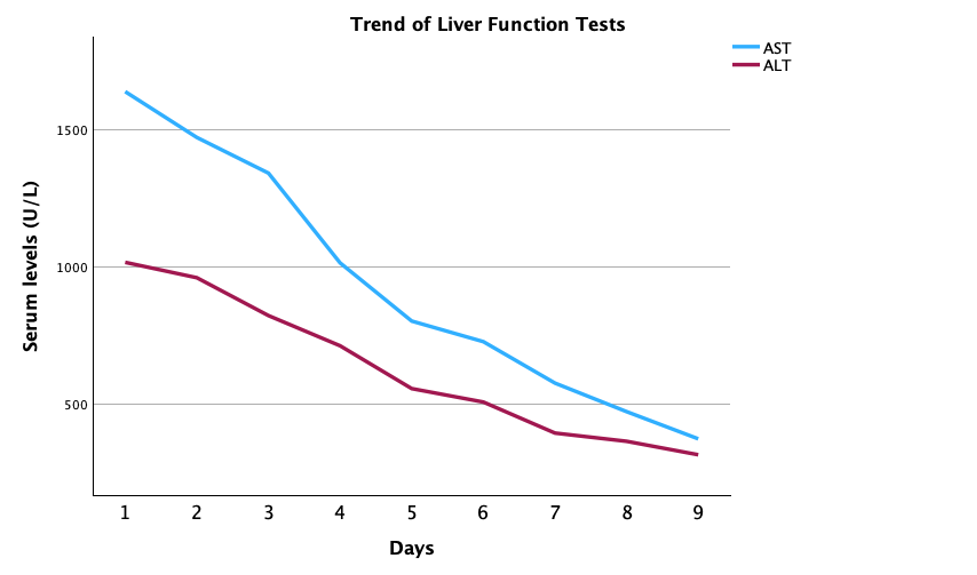Monday Poster Session
Category: Liver
P3913 - No Mushroom for Error: Reishi Mushroom-Induced Liver Injury Unmasking Autoimmune Hepatitis
Monday, October 27, 2025
10:30 AM - 4:00 PM PDT
Location: Exhibit Hall

Zoilo K. Suarez, MD (he/him/his)
University of Arizona
Chandler, AZ
Presenting Author(s)
Zoilo K.. Suarez, MD1, Zurain Kajani, MD2, Daniel Gutman, MD2
1University of Arizona, Chandler, AZ; 2Florida Atlantic University Charles E. Schmidt College of Medicine, Boca Raton, FL
Introduction: Reishi mushrooms are commonly marketed for their immune-boosting properties. We present a case of drug-induced autoimmune hepatitis (DIAIH) associated with Reishi-containing supplements.
Case Description/
Methods: A 91-year-old female with a history of ischemic stroke presented to our ED after a fall, reporting four days of generalized weakness, abdominal pain, nausea, vomiting, and dark urine. She had recently started taking a “GutRestore” supplement containing Reishi mushroom.
Initial labs revealed markedly elevated liver enzymes: AST 1,637 U/L, ALT 1,015 U/L, total bilirubin 7.9 mg/dL, direct bilirubin 4.3 mg/dL, and ALP 184 U/L. CBC was unremarkable. Conservative management was initiated, including discontinuation of the supplement, and she was admitted for further evaluation.
Inflammatory markers were mildly elevated (ESR 39 mm/hr, CRP 6.7 mg/L), with an INR of 1.3. Viral (hepatitis panel, CMV, EBV, HSV) and syphilis testing were negative. Autoimmune serologies revealed positive ANA (1:100) and F-actin IgG (35), with a normal IgG level and negative ASMA, anti-LKM-1, anti-LC-1, alpha-1 antitrypsin, and antimitochondrial antibodies.
Imaging showed cholelithiasis on right upper quadrant ultrasound, a 6 mm gallstone in the cystic duct on CT, and mild cystic duct edema on MRCP. Despite these findings, no evidence of biliary obstruction was noted. Liver enzymes were trended daily and gradually improved with corticosteroid therapy.
She was discharged after 10 days on a prednisone taper with outpatient follow-up arranged with her PCP and gastroenterologist.
Discussion: This case highlights an uncommon presentation of DIAIH in an elderly patient, likely triggered by Reishi mushroom ingestion. Autoimmune hepatitis (AIH) is classically seen in younger females, and its occurrence in nonagenarians is rare. Although late-onset AIH is documented, diagnosis in older adults can be delayed due to nonspecific symptoms and broad differential diagnoses for liver injury in this age group.
The temporal association between supplement initiation and symptom onset, combined with serologic findings and response to steroids, supports a diagnosis of DIAIH. It is hypothesized that Reishi’s immunomodulatory properties may incite or amplify autoimmune responses in susceptible individuals. As Reishi use grows in popularity, clinicians should maintain a high index of suspicion for supplement-induced liver injury, especially in atypical presentations.

Figure: Figure 1. Trends in Liver Function Tests During Hospitalization
Disclosures:
Zoilo Suarez indicated no relevant financial relationships.
Zurain Kajani indicated no relevant financial relationships.
Daniel Gutman indicated no relevant financial relationships.
Zoilo K.. Suarez, MD1, Zurain Kajani, MD2, Daniel Gutman, MD2. P3913 - No Mushroom for Error: Reishi Mushroom-Induced Liver Injury Unmasking Autoimmune Hepatitis, ACG 2025 Annual Scientific Meeting Abstracts. Phoenix, AZ: American College of Gastroenterology.
1University of Arizona, Chandler, AZ; 2Florida Atlantic University Charles E. Schmidt College of Medicine, Boca Raton, FL
Introduction: Reishi mushrooms are commonly marketed for their immune-boosting properties. We present a case of drug-induced autoimmune hepatitis (DIAIH) associated with Reishi-containing supplements.
Case Description/
Methods: A 91-year-old female with a history of ischemic stroke presented to our ED after a fall, reporting four days of generalized weakness, abdominal pain, nausea, vomiting, and dark urine. She had recently started taking a “GutRestore” supplement containing Reishi mushroom.
Initial labs revealed markedly elevated liver enzymes: AST 1,637 U/L, ALT 1,015 U/L, total bilirubin 7.9 mg/dL, direct bilirubin 4.3 mg/dL, and ALP 184 U/L. CBC was unremarkable. Conservative management was initiated, including discontinuation of the supplement, and she was admitted for further evaluation.
Inflammatory markers were mildly elevated (ESR 39 mm/hr, CRP 6.7 mg/L), with an INR of 1.3. Viral (hepatitis panel, CMV, EBV, HSV) and syphilis testing were negative. Autoimmune serologies revealed positive ANA (1:100) and F-actin IgG (35), with a normal IgG level and negative ASMA, anti-LKM-1, anti-LC-1, alpha-1 antitrypsin, and antimitochondrial antibodies.
Imaging showed cholelithiasis on right upper quadrant ultrasound, a 6 mm gallstone in the cystic duct on CT, and mild cystic duct edema on MRCP. Despite these findings, no evidence of biliary obstruction was noted. Liver enzymes were trended daily and gradually improved with corticosteroid therapy.
She was discharged after 10 days on a prednisone taper with outpatient follow-up arranged with her PCP and gastroenterologist.
Discussion: This case highlights an uncommon presentation of DIAIH in an elderly patient, likely triggered by Reishi mushroom ingestion. Autoimmune hepatitis (AIH) is classically seen in younger females, and its occurrence in nonagenarians is rare. Although late-onset AIH is documented, diagnosis in older adults can be delayed due to nonspecific symptoms and broad differential diagnoses for liver injury in this age group.
The temporal association between supplement initiation and symptom onset, combined with serologic findings and response to steroids, supports a diagnosis of DIAIH. It is hypothesized that Reishi’s immunomodulatory properties may incite or amplify autoimmune responses in susceptible individuals. As Reishi use grows in popularity, clinicians should maintain a high index of suspicion for supplement-induced liver injury, especially in atypical presentations.

Figure: Figure 1. Trends in Liver Function Tests During Hospitalization
Disclosures:
Zoilo Suarez indicated no relevant financial relationships.
Zurain Kajani indicated no relevant financial relationships.
Daniel Gutman indicated no relevant financial relationships.
Zoilo K.. Suarez, MD1, Zurain Kajani, MD2, Daniel Gutman, MD2. P3913 - No Mushroom for Error: Reishi Mushroom-Induced Liver Injury Unmasking Autoimmune Hepatitis, ACG 2025 Annual Scientific Meeting Abstracts. Phoenix, AZ: American College of Gastroenterology.
